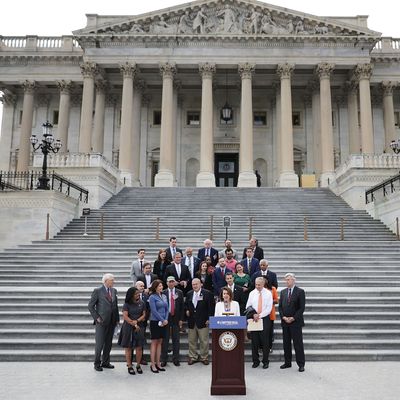
In 2018, Democrats are confronted with a challenge that few opposition parties have ever had to overcome: The administration they are running against has too many scandals (for their political opponents’ own good).
To the extent that party messaging matters at all in midterm elections (which are largely determined by differential turnout patterns shaped by “fundamentals”), a single, unifying narrative is more likely to connect with the electorate than a fusillade of discrete ideas. In 2016, the simplicity of the case against Hillary Clinton’s judgement (emails!) helped it register in the public consciousness to a degree that no single one of Donald Trump’s many scandals (his fraudulent university, abuse of contractors, alleged assaulting to women, mockery of the disabled, disrespect of prisoners of war, etc, etc.) ever did.
Over his first 17 months in the White House, Trump has generated novel outrages at a nigh-exponential rate. The investigation into his campaign’s ties to Russian intelligence alone has produced a wide variety of distinct scandals and meta-scandals (i.e., the president’s repeated efforts to turn federal law enforcement into his private goon squad). His (alleged) decade-old dalliance with a porn star has divided and multiplied into separate campaign-finance, pay-to-play, and potential money-laundering scandals. Virtually every person Trump has appointed to Cabinet-level office has committed at least one major ethics offense. And then, there are the myriad instances in which the interaction between Trump business interests and his administration’s foreign policy have given the appearance of venality on a world-historic scale.
For Democrats, the problem here isn’t just that the variety and volume of scandals prevents the media from conveying a single, simple story of Trump’s malfeasance; the problem is that none of the president’s extraordinary misdeeds are quite as big an electoral liability for the GOP as the party’s (thoroughly ordinary) devotion to the unpopular policy preferences of its plutocratic donors.
The Democrats’ best pitch to swing voters isn’t that the president’s personal ethics are suspect. Trump conceded that point early in his campaign. Rather, their strongest argument is that he and his party aren’t actually “greedy, greedy, greedy for the United States” — or the “forgotten man and woman” — but only for their wealthy and well-connected paymasters.
Happily, Democrats may have found a way to solve their conundrum: As New York’s Jonathan Chait recommended, Team Blue has decided to boil Trump’s many scandals — and his party’s reactionary policies — down into a single, overarching narrative of corruption.
On Monday, Chuck Schumer and Nancy Pelosi unveiled the latest plank in their party’s “Better Deal” platform — a series of anti-corruption proposals aimed at “returning to a government of, for, and by the people.” In their summary of the agenda, the Democrats waste little time in drawing a line between the Republican agenda on the culture of corruption at 1600 Pennsylvania Avenue.
President Trump promised to fight for the forgotten American, yet Republican-controlled Washington continues business as usual, rewarding the wealthy, privileged and well-connected at the expense of middle class and working families. Look no further than Congressional Republicans’ and President Trump’s agenda: billions in tax cuts for the rich, massive giveaways to special interests and the full-frontal corporate assault on workers’ rights and consumers’ protections. All the while, Americans watch with increasing alarm the efforts to limit access to the ballot box, put rich donors first and degrade the integrity of our election system by forces both foreign and domestic.
“President Trump, when it comes to draining the swamp, has been a complete and utter disaster,” Schumer said at a press conference on the Capitol steps Monday afternoon.“The swamp has never been more foul and more fetid than it is under this president.”
The Democrats’ anti-corruption agenda is threefold, comprising proposals aimed at increasing the voice of ordinary voters in their government; bolstering ethics laws; and reforming campaign finance. Many of the actual policies under these headings are progressive boilerplate (a constitutional amendment nullifying the Supreme Court’s ruling in Citizens United, ending partisan gerrymandering) or inscrutably vague (“all government officials — including the president — should comply with a stringent set of ethical guidelines that ensure they are free from all conflicts of interest”). But the party’s voting-rights platform does include an endorsement of automatic voter registration, a reform that the party didn’t adopt on the state level until recently, and which has significant potential to increase the influence of poor, young, and nonwhite voters over their political system.
The agenda also includes a new proposal directly inspired by Michael Cohen’s Essential Consultants LLC scandal. The president’s personal attorney never had to register as a lobbyist — or disclose the fact that he selling access to the White House to major corporations at hundreds of thousands of dollars a pop — because current law only requires such disclosures from individuals who spend more than 20 percent of their working lives lobbying on behalf of a client. Democrats would expand disclosure requirements in a manner that would force future Michael Cohens to disclose such “consulting contracts.”
Ultimately though, the Better Deal agenda is more of a political project than a governing document. As such, its fine details matter less than the broader story that it aims to tell. And in collapsing Trump’s scandals and the GOP agenda into a single narrative about Republicans standing for elite special interests — and Democrats standing for ordinary Americans — the party has found a strong (and simple) campaign message. And it also happens to be one with a track record of success: Democrats ran on an anti-corruption theme before its last midterm wave in 2006; on Election Day that year, exit polls found upward of 70 percent of voters saying that a concern about corruption influenced their decision in the ballot box.






























